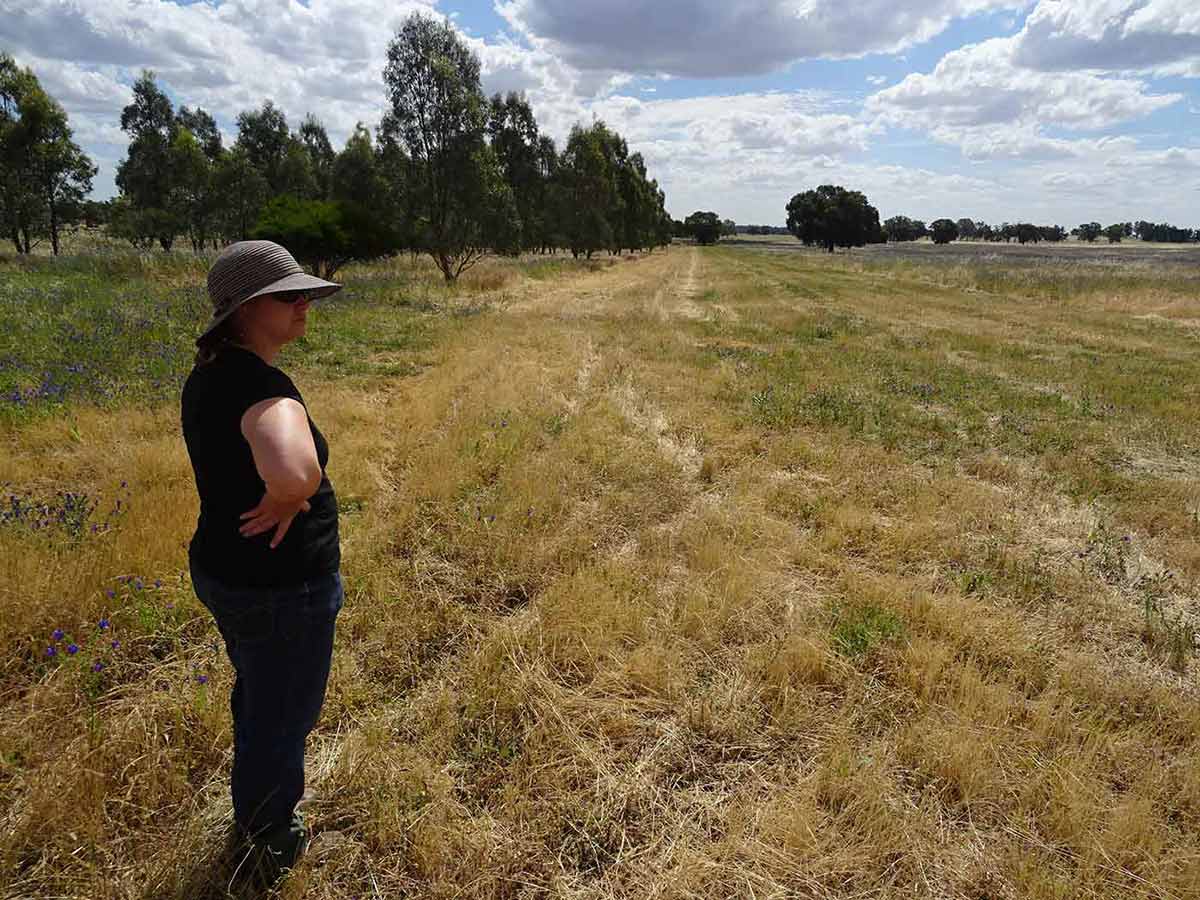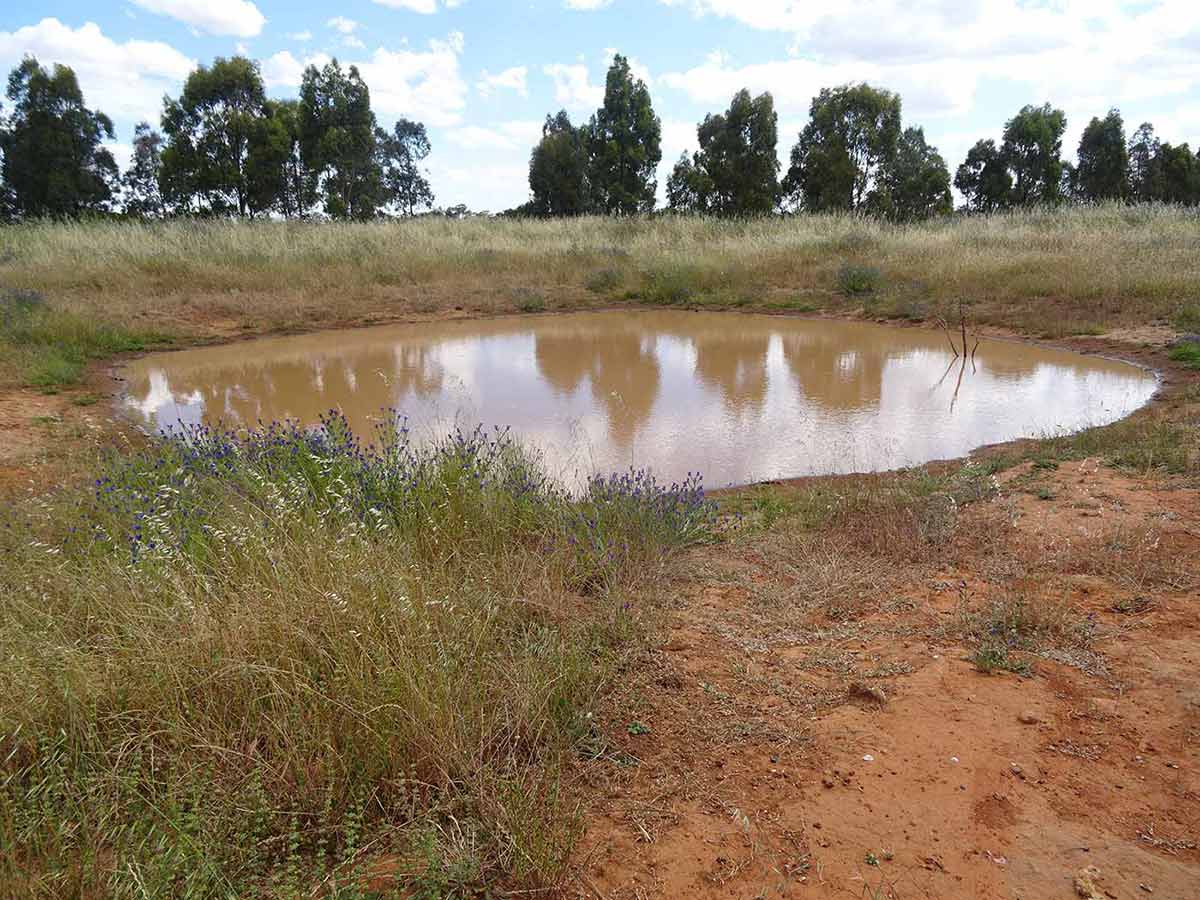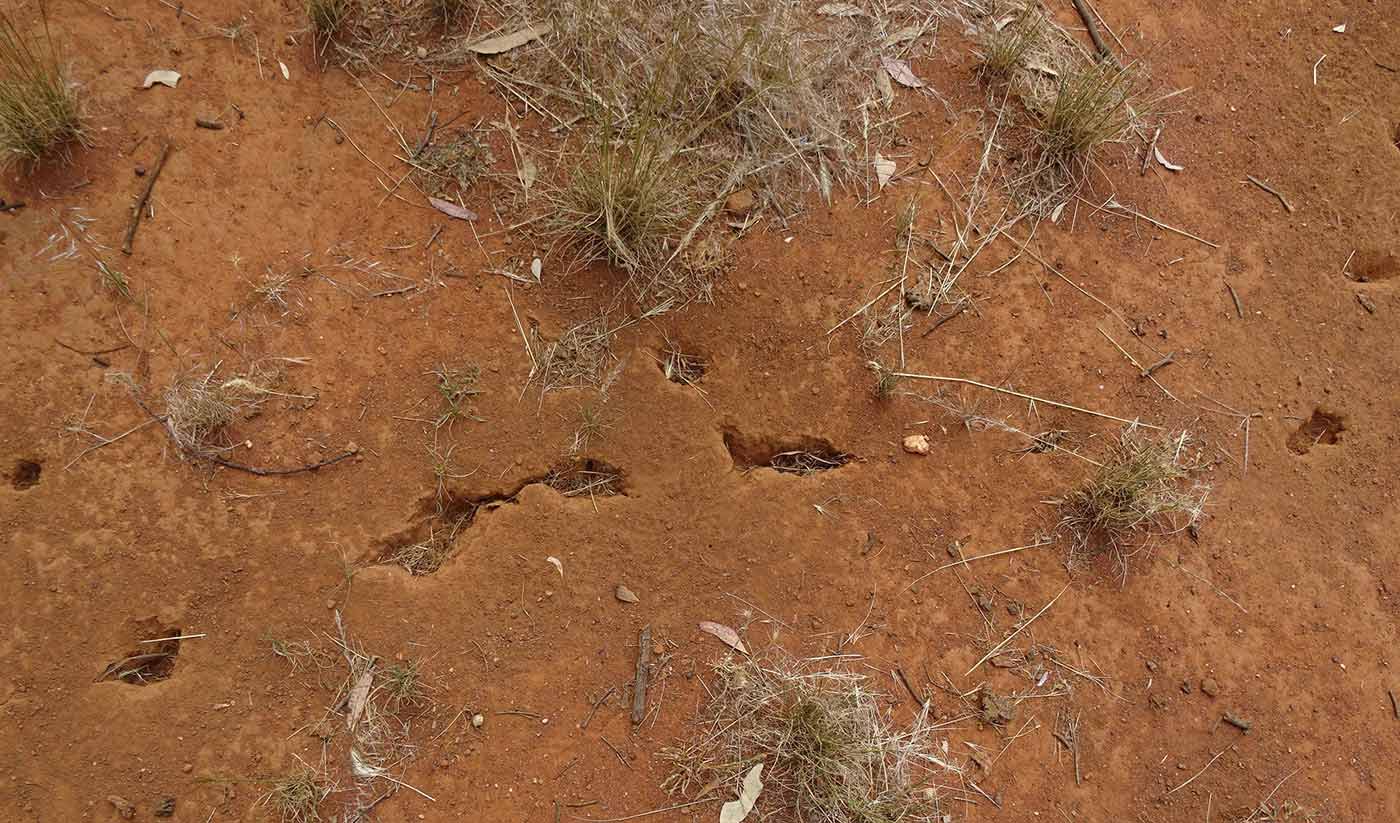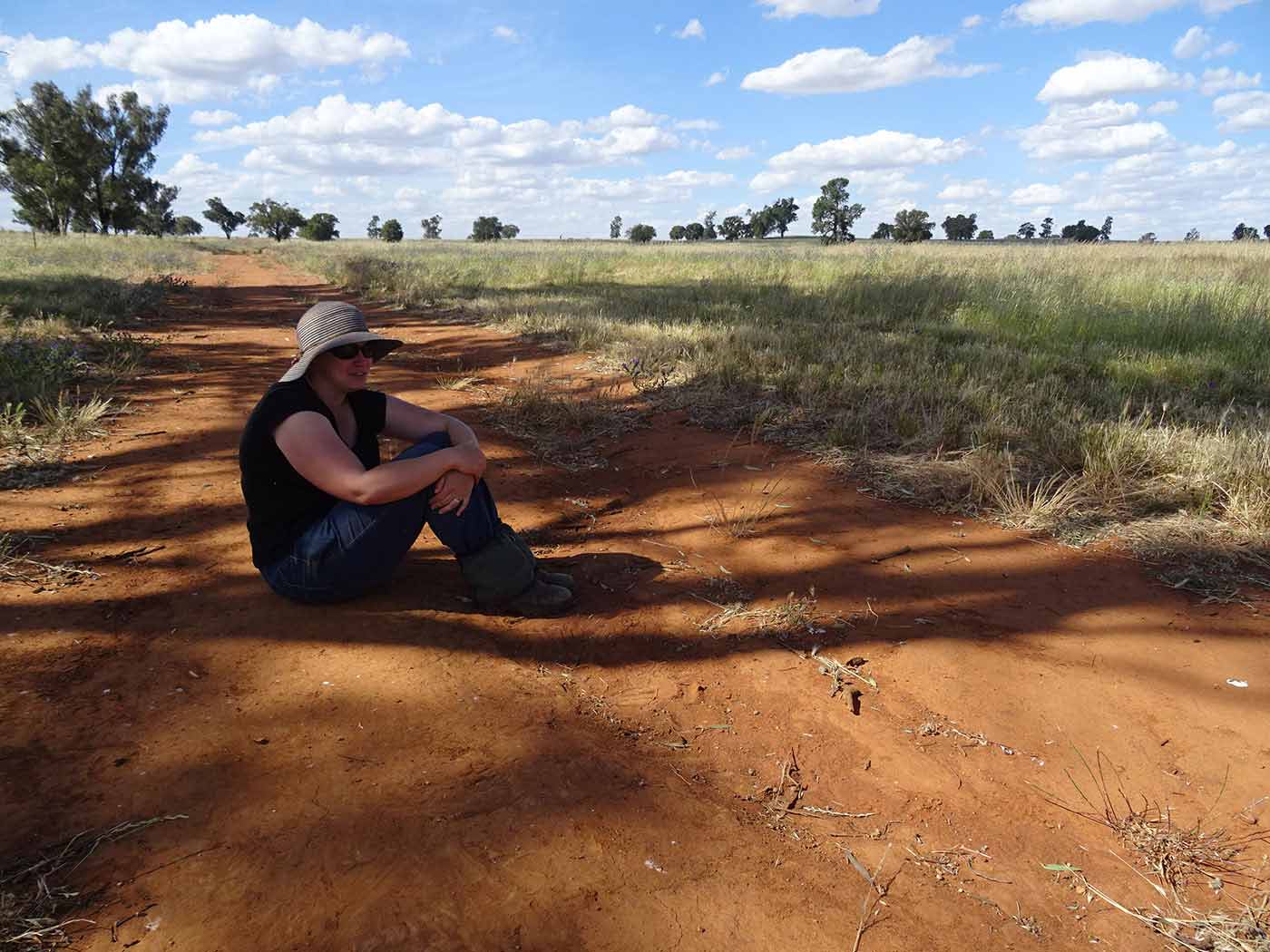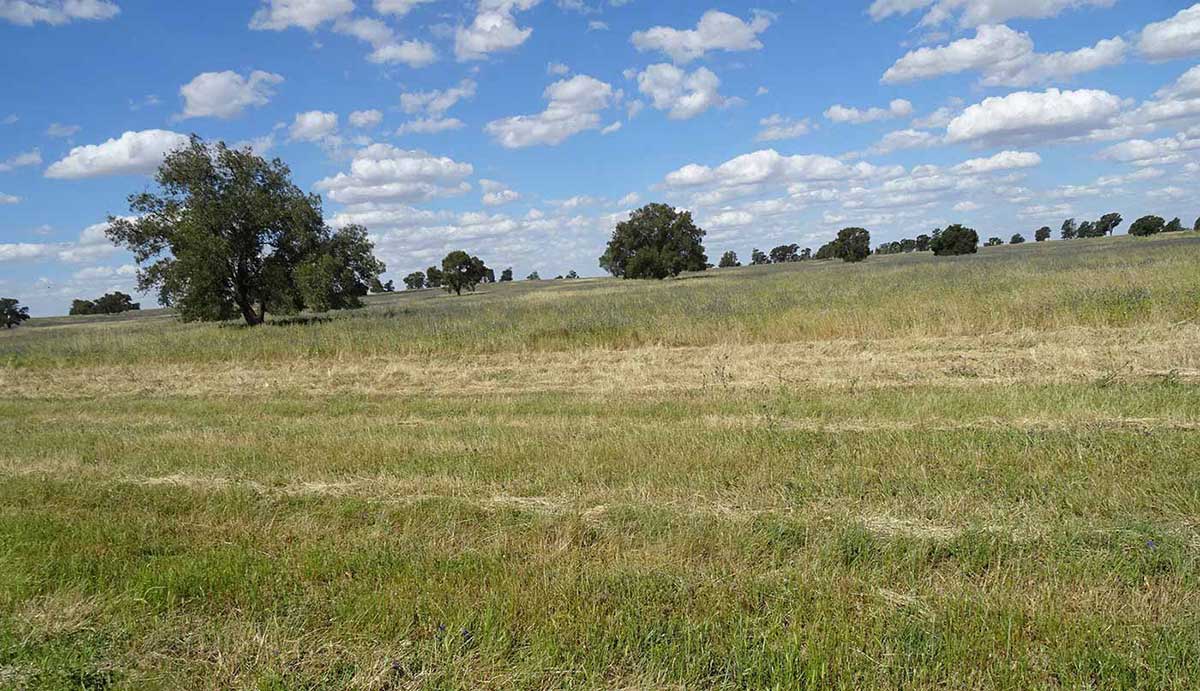5 November 2016
We exit the ute at the southeast corner of North Taylors. Before she unchains the gates and we walk through, Amanda Strong stoops to pluck grass seeds from the radiator. Grass is much taller than usual this year, and ‘kind of hard to avoid’, she says. A warm, blustery wind is pushing out of the southwest, so we decide to walk down the paddock close to the tree belt, to find some shelter.
Fortunately, a vista of mown pasture lies before us. Our socks and ankles will escape the barbed needles of grass seeds. Steve has been slashing paddocks for three weeks, Amanda explains, but without much headway. All the soil moisture and warmth encourages the grass to bounce swiftly back.
Now the season is turning. Soaking rain hasn’t fallen since October. Wet greens are beginning their drift to crisp yellows. Temperatures are building, earth starting to dry. Steve is getting the grader ready, says Amanda, and will soon be driving the fence lines, scraping soil and vegetation aside to make long firebreaks. Abundant spring growth generates risks of summer catastrophe.
Amanda moved to Oakvale from Wagga nearly four years ago, she tells me, and commuted back for work, three days each week. When she and Graham had Geoffrey, Amanda stopped work for a year, and has just returned. Our movement disturbs an anxious family of white winged choughs. The birds fly away from us, out into the paddock from the tree belt, and disappear into the dark shelter of a kurrajong tree, their drawn, soulful calls tumbled by the wind.
Showers are forecast. Clouds are sailing eastwards, holding some moisture. Amanda doesn’t think they’ll deliver much. Hundreds of small flies shroud my back, and I almost swallow one. ‘They’re very friendly’, Amanda laughs. ‘Don’t get carried away by them’. Dragonflies hover and dart before us. The grass is alive with moths and fleeting grasshoppers. The breeze is keeping mosquitos down. ‘On a day that’s not windy, you’ll just get eaten alive, if you don’t have repellent on’, Amanda explains.
Like the other insects we are encountering, there are more mosquitoes now than is usual for November. Mosquitos normally die away in the colder months. During the warm winter of 2016, Amanda didn’t experience a week without the unwelcome attention of mosquitos.
In the district, people are worried about mosquito borne diseases. How to avoid getting stung is a common topic of conversation. Narrandera Shire Council recently sprayed insecticide across town parks, where excessive moisture and unusual warmth has enabled an abundance of mosquitos. ‘All the old blokes are talking about it being the wettest winter they’ve ever known’, Amanda says.
There’s concern the harvest will be delayed because wet, soft paddocks won’t carry harvesters and other heavy farm equipment, and crops won’t dry sufficiently. Our bodies in humid, billowing air, we push through Paterson’s curse and wild oats to see how much water the dam holds.
Resuming our westwards stroll, Amanda mentions the ruined crops along the sodden Murrumbidgee River floodplain. Public roads beside Oakvale paddocks flooded too, when farm dams couldn’t hold the flow. For a week she couldn’t get into Narrandera.
In canola crops, excessive moisture created ideal conditions for fungal growth. Crop-dusting planes buzzed past every day, delivering fungicide to ailing plants. Demand outstripped supply, and newspapers carried stories of a fungicide shortage. We stop to gaze at bare earth by the tree line, where the local clan of white winged choughs have pecked into the shallow chambers of ant nests, to extract a juicy feed.
Last night most of Australia witnessed Donald Trump declaring victory in the United States presidential election. What might be the consequences, I ask Amanda, of Trump’s victory for here, for this paddock? ‘Well, he’s not going to do anything more about climate change’, she answers. ‘He’s not going to commit to any greater measures, so that’s going to affect farming, locally.’ We reach the western boundary and turn north, and decide to sit in the broken shade of grey box trees, on the compressed red earth of the track.
Amanda finds it ‘hard to think about’ what climate change means for Geoffrey’s future. She talks of mitigating risks, of the challenges of building a farming system within unpredictable patterns of climate, a system that might generate produce from a burst of rainfall or a month of mild weather. Others in the district are less concerned, even sceptical.
Worrisome climate data and warnings from scientists are increasingly difficult to ignore, Amanda says, and the proportion of locals who don’t accept the science of climate change are probably now a minority. Motivation for cultural and behavioural change remains scarce, the immense challenges of climate change often popped into the ‘too hard basket’.
In a few years, Geoffrey will probably start school at Boree Creek, the small town down the road. He won’t go to boarding school in Melbourne, as his father did. Graham didn’t enjoy boarding school, and most local kids now attend high school in Narrandera. Public education has improved, Amanda reckons. We talk about traditions of sending country children to city boarding schools, of the ties to rural places and people weakened and broken in the process.
Does time away during formative years influence modes of management when a boarder returns to manage a farm? If the child stayed at home instead, and witnessed the ageing of a beloved paddock tree, might they be so willing to fell the ancient organism, to push the red earth, to cast ever wider machines across emptied space, to extract maximum yield? ‘There was a lot of tree clearing last year, heaps of it, way more than usual’, Amanda says. We wonder what North Taylors would look and feel like, how its ecological patterns would break, if all the white cypress trees standing gracefully in the paddock were removed.
Within an industrial management system, Amanda explains, dependent on the application of external inputs, trees are costly. Canola could grow instead, in earth made productive by fertiliser, protected by insecticides and fungicides.
We talk about precision farming technologies that monitor the application rates of inputs across farming paddocks and calculate the extra costs incurred when machinery operators navigate around trees. While input costs are factored into software algorithms, the subtle, longer-term contributions of paddock trees to productivity, to ecological resilience, are not. There’s a shallowness to such calculations, an absence of time, of culture and depth.
We stand to retrace our steps back to the ute. Beside the track are marsupial droppings. ‘Yeah, there’s plenty of kangaroos and wallabies around’, Amanda says. We walk over to the edge of the broad, slashed pathway, and stop to examine the pasture. Clover is thriving, its twining growth a dense and spongy mass.
Wind has dropped. Clouds blown away. Afternoon sun warms our backs. As we near the ute, Amanda reflects on our conversation, and sketches a final observation. People think technology will rescue humanity from the vagaries and shocks of climate change, she explains, ‘but I think it is going to be a bigger problem than that.’
As a community, we need to take the issue more seriously, Amanda reckons, and take steps to prevent excessive global warming, not just adapt to it. Our confidence in human ingenuity, in our capacity for ‘working our way out of it’ through innovation is misplaced. ‘I don’t think we’re going to be able to. Nothing can make it rain.’
Explore more on the Paddock Report
